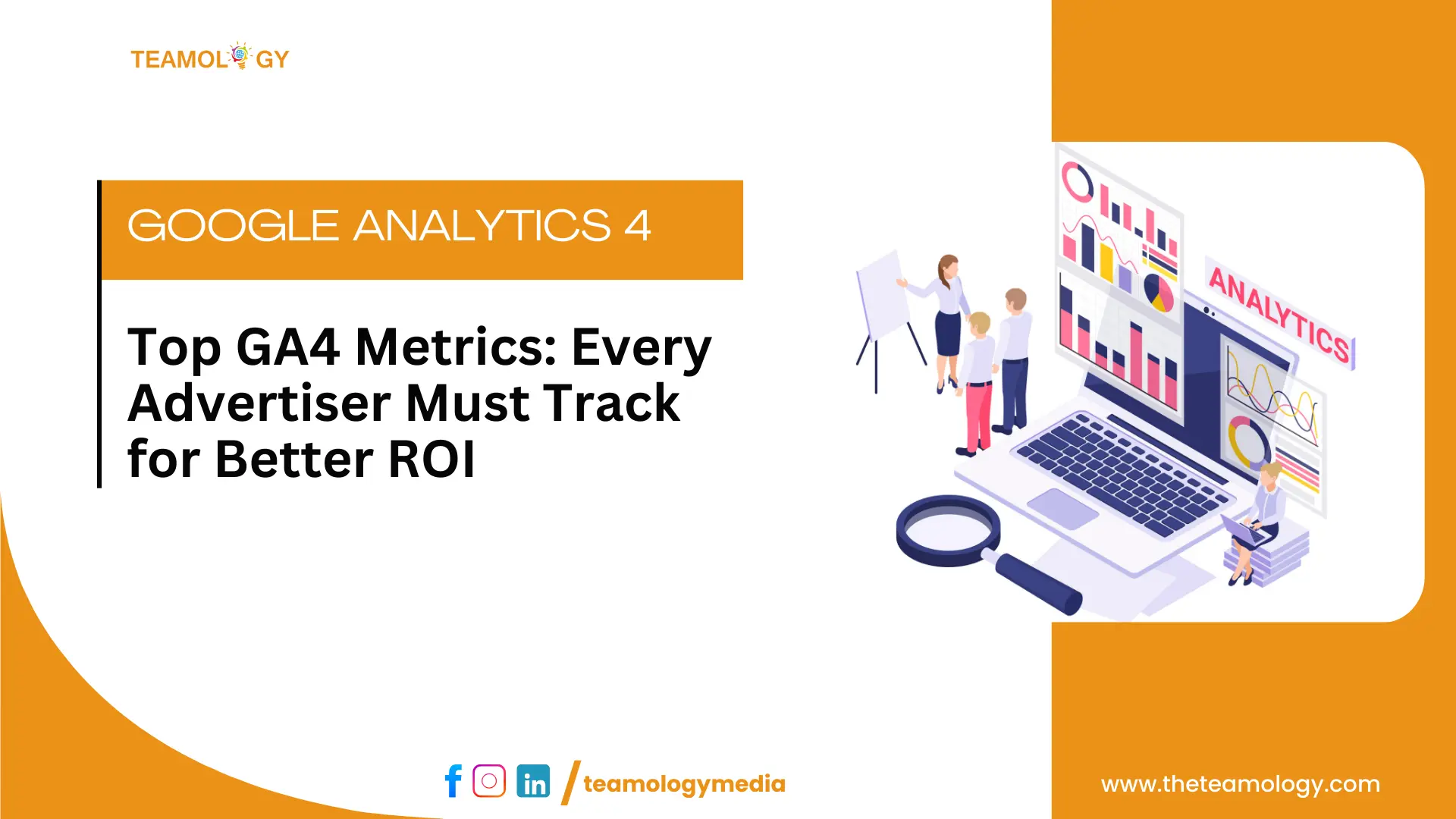GA4, or Google Analytics 4, is the latest version of Google Analytics, which emerged from Universal Analytics due to a significant change. This new platform uses an event-based tracking model that allows advertisers to track every user interaction more clearly and deeply. This results in more accurate information about the outcomes of ad campaigns and user journeys, ensuring that advertisement budgets are optimized.
The key purpose of this blog is to talk about the Top Google Analytics Metrics crucial for advertisers to be vigilant about. These metrics help measure and analyze the effectiveness of ad campaigns and hence play vital roles in fact-based decision-making and campaign optimization.
Understanding Google Analytics 4 Metrics
What Are Metrics in GA4?
GA4 metrics measure user interactions on our websites or apps, such as the number of users, sessions, engagement rates, etc. Such data is fundamental to digital analytics, where we can numerically analyze performance through metrics. Dimensions like the source of traffic and device types used make these metrics contextual and help us understand why the performance is the way it is.
The Evolution from Universal Analytics to Google Analytics:
The transition from Universal Analytics to Google Analytics enables us to capture more nuanced and extensive user interactions. This new model records each event separately, providing more accurate and detailed information for evaluating campaigns.
Importance for Advertisers:
Advertisers increasingly rely on Google Analytics to monitor campaign performance and ROI. More effective monitoring of user journeys through the site or app allows advertisers to boost campaign outcomes, make better use of money, and make data-driven choices.
Key Google Analytics Metrics for Advertisers
A. Users & Sessions:
Users: In GA4, we can assess the size and diversity of audience groups using unique visitors to predict the amount of outreach an ad campaign can generate.
Sessions: Sessions help us know how frequently users visit a site and how long the session durations are essential parameters for analyzing a website’s engagement and user behaviors.
B. Engagement Metrics:
Engagement Rate & Average Engagement Time: These are often considered the best Google Analytics metrics as they are more effective than traditional bounce rates. This is because they measure user interactions and time spent on content, which is crucial for understanding content relevance.
C. General Events & Key Events:
- General Events:
Page views, scrolling, clicks, and video play are general events that help identify a user’s journey. - Key Events:
Key events are essential activities like purchases, sign-ups, or actions like add-to-cart; tagging them as ‘key’ can help in conversion tracking.
D. Conversions & Conversion Rate:
Google Analytics tracks conversions and differentiates between user and session conversion rates, which is crucial for evaluating the campaign.
E. Revenue & Lifetime Value (LTV):
It helps track how much money is generated through a website or app and what the site or app generates in lifetime value.
F. Advertising-Specific Metrics:
Linking your website with Google Ads creates room for unified reporting, which is especially helpful for improving bidding strategies and campaign optimization.
Integrating GA4 with Advertising Platforms
1. Linking Google Ads and Google Analytics:
Linking GA4 and Google Ads can give advertisers the leverage of tracking unified conversion with enriched audience insights, helping to evaluate the effectiveness of campaigns and make data-driven decisions.
2. Impact on Campaign Optimization:
Shared key events play vital roles in automated bidding strategy and campaign optimization, ensuring the best use of budget and improved ROI.
3. Real-World Applications:
As a real-life use case, the integration of GA4 and Google Ads has been helping advertisers improve their audience targeting, control money spent on ads, and increase conversion rates—proof that these Top Google Analytics Metrics truly drive success.
How to Interpret and Act on Google Analytics Data
1. Data Analysis Best Practices:
Adopt effective tricks to set up dashboards and custom reports that will enable you to analyze GA4 data quickly. In parallel, regular data validation and cross-checking should be applied to avoid common mistakes, such as wrongful interpretation of engagement metrics.
2. Actionable Insights:
Advertisers can improve their campaigns by analyzing GA4 data. For example, they can make specific campaign changes by identifying which message or content performs best.
3. Optimization Strategies:
It is possible to improve campaign outcomes by crafting better ad copies of your campaigns backed by data, choosing the right target audience, and making strategic changes in budget allocation.
Best Practices for Implementing Google Analytics Tracking
1. Setting Up Correct Tracking:
One significant action is correctly configuring automatic, enhanced, and custom events because, without the proper tracking, you can’t get the correct data regarding user behavior and campaign effectiveness.
2. Creating and Managing Key Events:
There should be proper guidelines to identify and manage which events should be labeled as ‘key’ according to your business goals, helping to focus on important events.
3. Maintaining Data Accuracy:
One more essential step is to ensure the reliability of your campaign analysis by implementing regular audit and data validation practices so that you always get authentic and valuable data from GA4.
Tools and Resources
1. Supplementary Tools:
Tools like BigQuery and Data Studio can be integrated with GA4 to achieve in-depth data analysis, with options like customer reports, data visualization, and more extensive data exports. This results in a more accurate evaluation of campaign outcomes.
2. Learning Resources:
Google’s official documentation, numerous tutorials, and blogs (like Analytics Mania and MeasureSchool) provide detailed information about GA4. These resources can help advertisers optimize their ad campaigns through correct configuration, refined tracking methods, and improved analysis.
Conclusion
Every advertiser should focus on some of the key metrics of GA4 we discussed in this blog: Users, Sessions, Engagement Metrics, Conversions, General Events, Key Events, Budget, Revenue, and more. By using Google Analytics to monitor these crucial indicators, you can continuously refine your campaigns and stay ahead of the competition.
For more information on Google Analytics, please contact us. We will guide you through optimizing your GA4 setup so that you can make the best decisions backed by data to improve your campaign’s effectiveness and ROI.
Advanced GA4 metrics will be introduced, and new features and updates will constantly be added. So, you should keep yourself updated about Google Analytics to keep your analytical strategies relevant.
FAQs or Common Questions
1. How does linking Google Ads with Google Analytics benefit campaign performance?
Integrating Google Ads and Google Analytics can benefit advertisers by providing unified tracking, enriched audience insights, and an automated bidding strategy. This helps them increase the effectiveness of their campaigns, maximize their ad budgets, and improve ROI.
2. How can I set up custom events in Google Analytics?
Go to the Google Analytics admin panel for custom event setup and choose the “Create Event” option. Here, personalized rules and parameters can be set to capture specific user interactions (like unique button clicks or form submissions).


